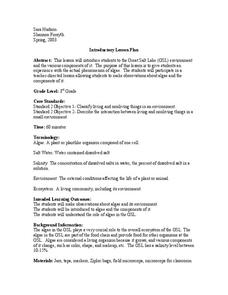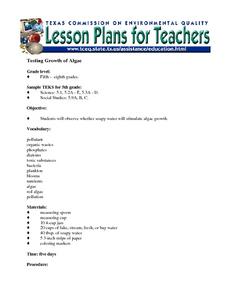Curated OER
Great Salt Lake
Third graders are introduced to the Great Salt Lake (GSL) environment and the various components of it. They make observations about algae and its environment and discuss why it is considered a living organism and various components of...
Curated OER
How Clean is that Water?
Students conduct a water quality experiment on a local stream using benthic organisms as a water quality indicator. Based on the results from the experiment, students determine how engineers use this background information to make...
Curated OER
Microworlds in Waterways Around You Home
Students explore the concept that different waterways support different organisms. After completing experiments, students predict what life-forms exist in each waterway in their area. They research how humans impact the habitat of other...
Curated OER
Let it Grow and See What Happens
Middle schoolers participate in an experiment in which they try to stop algae from growing. In groups, they develop a hypothesis and test it while making changes to the experiment along the way. They make observations and organize...
Curated OER
Testing Growth of Algae
Students participate in an experiment in which they test the growing rate of algae. They test the algae in different elements recording their observations. They share their results with the class and discuss.
Curated OER
There Are Algae in Your House!
Learners complete a worksheet at home stating what types of food they have at home with algae in it. They, in groups, compare with each other what they have on their worksheet.
Curated OER
Water Quality and Nitrates & Phosphates
Students examine the effects of nitrates and phosphates on the dissolved oxygen levels in different water sources. In this series of 3 lessons, they consider the reasons for nitrate and phosphate level increases and their effects on...
Curated OER
Is There Seaweed/Algae in Your Food?
Pupils discover that seaweed/algae is a small part of the resources the oceans provide. By investigating common household products, students discover that human senses are not enough to detect the presence of seaweed/algae in food.









